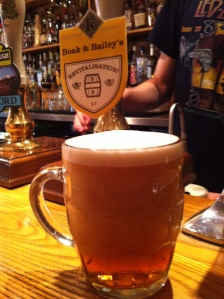Brew Britannia: The Strange Rebirth Of British Beer (Book Review)
In North Bar on Monday evening, when Ray Bailey signed my review copy of Brew Britannia: The Strange Rebirth Of British Beer, he told me to be honest in my opinion of it. In the end, there is no need to be anything other than candid: I haven’t devoured a book about beer so quickly and enjoyably since five years ago, when I read Pete Brown’s own social history of beer, Man Walks Into A Pub, sneaking off to read a couple of chapters in every lunch break.
Jessica Boak and Ray Bailey’s book traces the last fifty years of British beer, drawing together consumer organisations, brewers, writers, drinkers, pubs, restaurants, retailers, television personalities and politicians into a single narrative that is much more coherent and entertaining than anyone is entitled to expect. The results of extensive archive research and unique interviews are communicated in a clear and concise writing style, resulting in a text that moves at quite a pace through history, dropping in nuggets of amusing trivia along the way. I was grateful that they had waded through all those old newsletters so we don’t have to, but also regretted not having a pint with many of the interviewees.
Key actors, such as City gent and Society for the Preservation of Beers from the Wood founder Arthur Millard, ambitious Firkin entrepreneur David Bruce, restless brewing genius Brendan Dobbin and the canny, business-minded James Watt are sketched out in a delicate but wry manner that captures some aspect of their personality. The authors succeed in telling a story of fascinating and human characters, rather than what this might have been: a chronology of breweries, pubs and consumer organisations which started up, influenced the industry to one extent or another within a few years, then either collapsed or survived into varying degrees of irrelevance in a changed world, alongside more recent examples who have yet to do so.
Apart from the general sweep of the book, tracing the development of British beer from something which was enjoyed passively by those who drank it through to the real ale revival, winification and the more recent craft keg and diversity of obscure styles, there are some interesting recurring themes.
One such theme is the impact of class and politics in the beer movement. The gentleman piss artists of the Society for the Preservation of Beers from the Wood come together in the City of London, encouraged by the Financial Times’ beer journalism. The founders of the next generation consumer group, CAMRA, comprised journalists of a 1970s left-wing bent, leading to divisive conflicts over capitalist or campaigning activities. David Bruce, opening the Goose & Firkin in 1979, is determined to be a millionaire and achieves a profit of £2million on a sale of the chain in 1988, at the price of seeing it commoditised by the buyers.
The book should be appreciated by any reader with an interest in beer, regardless of prior knowledge. Those beer geeks who might feel that most writing on the subject, when it consists of more than just collections of tasting notes, tends to resurrect the same arguments, restate the same dubious history or descend into technical detail that means little to them, will be satisfied by the rigour of the research and the freshness of the writing. In particular I found that it corrected, tied together and placed in context disparate pieces of knowledge that I’d picked up from various sources, as well as including a great deal that was completely new to me, such the role of Jeremy Beadle in CAMRA or Oliver Peyton in the 1990s beer scene.
The book has a touching epilogue, revisiting the veterans of the SPBW, with the poignant final quote (which I won’t ruin for you) providing the apparent message of a book which otherwise maintains a tone of relative neutrality if not complete objectivity: that over 50 years successive generations have, often in very different ways, discovered what they believed to be “good beer” and valued it enough to do something about it.

